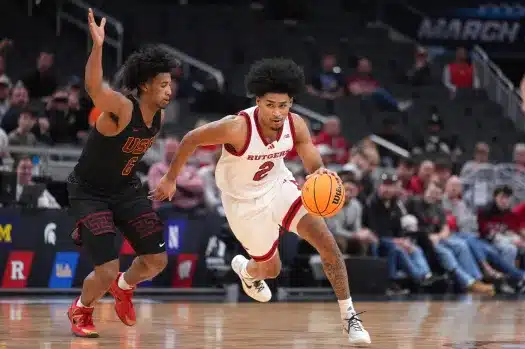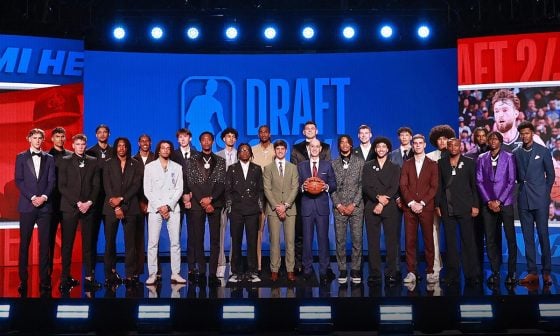Back in 1989, a young Doug Collins and an even younger Michael Jordan sat at a podium before a room full of reporters, all of whom were wondering, “Doug, what did you call that set Jordan up for ‘The Shot’?” “The Shot,” despite Jordan’s career knowingly being full of too many big shots and big moments for that moniker to be distilled down to one play, refers to the leaning jumper the greatest basketball player to ever live sank over the outstretched, flailing arms of Cleveland Cavaliers’ guard Craig Ehlo to down the Cavs and send his Chicago Bulls to the second round of the ‘89 playoffs. And as Collins put it, the play he called to help architect such an iconic moment was simple: “That was ‘get the ball to Michael, everybody get the f*** out of the way.’”
On Thursday night, Boston Celtics big man Al Horford wasn’t nearly as colorful in his response to a reporter’s question about how the C’s fueled one of the greatest comebacks in recent NBA Finals history to stun the Golden State Warriors in Game 1 and steal home-court advantage in the series. Horford didn’t have to be clever or crass; he was just as effective by saying what he needed to in order to make it clear that one man, in particular, deserved a bulk of the credit for the comeback.
“I think that for us the key was Jaylen Brown.”
While Game 1 of the 2022 NBA Finals will be remembered generally, by most, as the game in which the Celtics spurred a 20-plus point turnaround to take a 1-0 lead over the presumptive series favorite, perhaps a better way to ensure that it’s enshrined in some small corner of the history books somewhere is by pedestaling its fourth period as “The Jaylen Brown Quarter.” He scored 10 of the Celtics’ first 14 points in the frame, and assisted on Boston’s other two baskets in that stretch. In total, he either scored or assisted on 20 of the Celtics’ first 23 points of the fourth quarter.
Entering the fourth, Brown was 6-for-17 from the field with 14 points and had an overall plus-minus of -5, another mediocre outing staring him down. He finished his evening with 24 points, made 10 of his 23 shots for the game, and recorded a plus-27 in the fourth quarter, tied with Jayson Tatum and Derrick White for the game lead. That’s nothing short of remarkable; the Celtics are nothing short of behind in this series without it.
feels like we’re not giving enough daps to Jaylen Brown for completely taking over and igniting that comeback
— CelticsBlog (@celticsblog) June 3, 2022
Without Brown’s fourth, the calls for this series being over after one game would be throbbingly loud this morning. Without it, we might still be placing the most emphasis from last night’s contest on how the Celtics seem to have an aversion to playing anything resembling basketball in third quarters, full stop; or on Jayson Tatum’s poor shooting performance, despite his career-high 13 assists; or on an early insistence by the Celtics to defend the best shooter the sport has ever seen through drop coverage schemes.
None of that today, though. Instead, we should look back on Game 1 — the fourth quarter in particular — as the gamc frame that Jaylen Brown took over like he has made a habit of doing so far during this postseason.
Jaylen Brown tends to score in bunches. But that fourth quarter stretch from him was probably the best I’ve ever seen him play. I just rewatched it and he was so incredibly dominant. That was truly “Hop on my back fellas, I’ll carry you home” stuff.
— Keith Smith (@KeithSmithNBA) June 3, 2022
First, some housekeeping matters. The Celtics entered the fourth quarter trailing the blistering-hot Warriors, 92-80, having just been outscored 38-24 in the third. By game’s end, Boston headed to the locker room boasting a final total of 120 points, while Golden State walked off their home floor with 108. That math checks out to Boston winning the fourth quarter 40-16, the largest fourth-quarter margin in NBA Finals history. It’s hard not to point to Brown’s insane stretch to start the quarter as the shove, not the nudge, that got the ball rolling and the Celtics back into the game.
The run started around the 11-minute mark — the score 92-80, Golden State — when Brown drilled a step-back jumper over Draymond Green, who he’d worked out of position with the step-back jolt that preceded his shot. Moments later, Brown drilled a 3-pointer in Jordan Poole’s face, the triple marking his first make in six tries from behind the arc (he’d finish 2-of-8, with more on his other make in a moment). On the ensuing possession, Brown played a part in influencing a Poole turnover; he turned that turnover into points, lobbing a soft toss to Robert Williams, who slammed it home. 92-87, Warriors, who called a timeout following Williams’ dunk to sort things out. “Here comes Boston,” ESPN’s Mark Jones yelled into the microphone, his words set to unsettled murmurs from the Chase Center crowd.
Coming out of the timeout, Brown picked up where he left off, snatching a (terrible) Andre Iguodala pass out of mid-air, taking it the other way, and finding Payton Pritchard for a layup on the break. Boston’s unanswered 9-0 run was then answered by an Iguodala dunk, one that Brown soon answered with a corner three. (Here, it’s 94-92, Warriors, in case you hadn’t been keeping track). Moments later, with Golden State leading 97-92, Brown took it to the rack himself, finishing a swooping, up-and-under layup. Brown dealt two consecutive assists to Derrick White on Boston’s next two scoring possessions, both three-pointers, the latter one being a well-contested prayer that White turned up his personal sliders in order to make. That triple tied the score at 103. Golden State would never lead again; just because he could, Brown capped off his night with one final dime to a cutting Al Horford, who turned the pass into an icing on the cake three-point play.
(At any point during this stretch, I would’ve let one of Mark Jackson’s trademark “Mama, there goes that man” quips slide. And I hate it when he says that.)
“[At the] start of the fourth quarter, with the way he came out and played, with his energy and scoring,” Horford further noted postgame. “I just think that that was the start for us of something there.”
Head coach Ime Udoka added that Brown “had a great start to the fourth quarter. With [Jayson Tatum] struggling a little bit, we went to him more. He was extremely aggressive getting downhill. Got the bigs switching on him and got the shots that he wanted.”
That has tended to be the case with Brown over the course of this postseason, his now-renowned ability to find and create his own shot being on full display, especially in the final quarter. After last night’s blistering performance in the fourth, Brown is now shooting 63 percent from the field and 65 percent from three for the quarter this postseason. His effective field goal percentage in the fourth quarter now sits at 76.4; among players who have played at least 150 possessions in fourth quarters this postseason, that’s the second-best percentage, trailing only Reggie Bullock (76.9).
Brown also leads all players with 130 fourth-quarter points. There have been outliers — Brown scored just three points combined in the fourth quarters of Games 6 and 7 of the Eastern Conference Finals against the Miami Heat — and there may very well be outlying nights moving forward. But the way Brown continues to respond in fourth periods, especially when his fellow star is struggling to score on his own, is a sign of surefire resilience and just the right amount of unmitigated gall that would make a certain ESPN commentator proud.
That Brown got the shots he wanted is one thing, one that is a bit more of a formality for a score-first guard of his ilk. It’s the way he found a way to couple offensive creation for himself with creation for others that really set his efforts last night apart. Despite persistent issues with his handle and the occasional errant pass, Brown has shown flashes of steady upward growth as a playmaker, particularly during some of his best stretches in late-game situations. Last night was a prime example of that very fact: All five of Brown’s assists came in the fourth quarter, when they were arguably most needed.
No, he’s nowhere near the passer that Jayson Tatum has become, nor has he found a way to maintain success as a possession starter. But Brown’s finest moments shine bright due to his savvy reading of defensive schemes when he’s trying to find a teammate a quick shot before the defense can settle. He has also grown into a pinpoint break starter, one who opponents have to fear both as a feeder or the one feasting.
“It’s something he’s growing and learning about,” Udoka said. “[He’s] still learning to play in that crowd and make the right read at times. Early in the game he … had some turnovers and some tough shots. We showed that at halftime that we don’t have to take any of those.”
After the game, Brown was quick to defer any and all credit he might receive to those around him. “We win as a team. I know the media likes to push the narrative between certain players, but it’s a team game,” he said. “The best team is going to win, not the best individual player. We just got to keep playing as a team and we’ll be all right.”
He’s right. But sometimes, teams need one player to decide that, at a dire moment, they are going to become that game’s best player and do whatever it takes to ensure that the best team — their team, in their eyes — doesn’t lose, despite what may or may not be a checkered past as it relates to their clutch ability. After the game last night, CelticsBlog’s own Jeff Clark reminded me of Bill Simmons’ “Table Test,” which centers on the phrase, “I’m not sure if Person X brings anything to the table,” but really has three legs to it:
- Person X brings something to the table.
- Person X brings nothing to the table.
- Person X takes things off the table.
It’s only fair that, with Brown’s fourth quarter in mind, we add a fourth bullet to the table test: Person X brings far more to the table than they take off. On his best nights, that guy is Jaylen Brown. Yes, on some nights, Brown may be the guy doing far too much, thus taking things off the table. On other nights, he’s doing too little — not playing with nearly enough aggression, which also sees him inadvertently taking things off the table. But when Brown brings something to the table, he brings it all: a five-course, Michelin star-worthy meal that he plans to share with everyone.
There are few players capable of finding that balance as frequently as Jaylen Brown can when he’s locked in. That’s fair, given that when he’s on, there are few players like Jaylen Brown.





